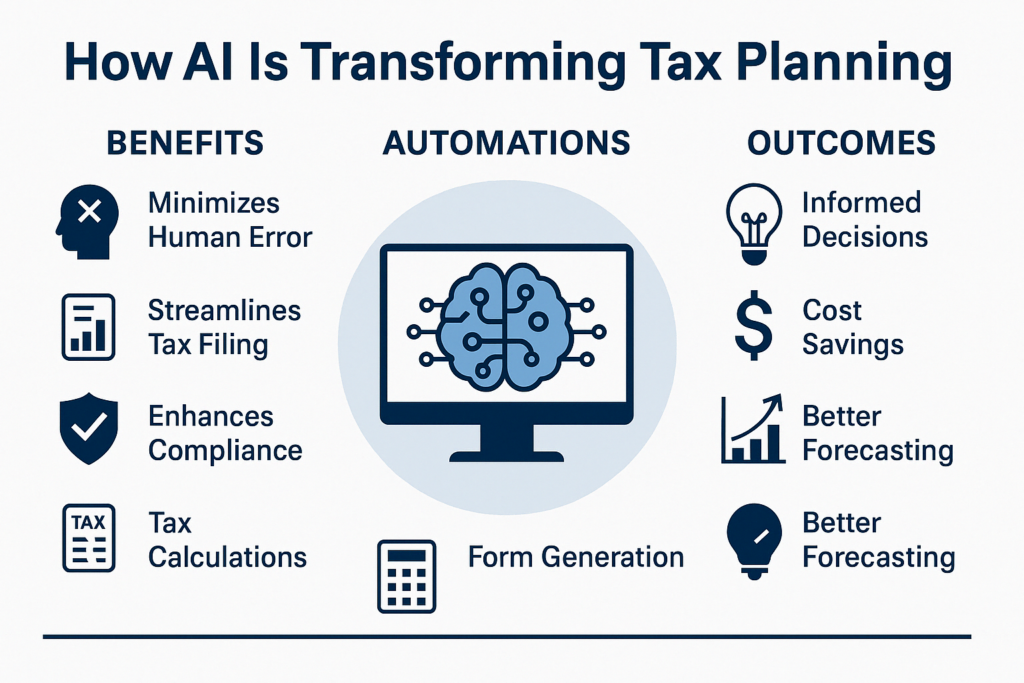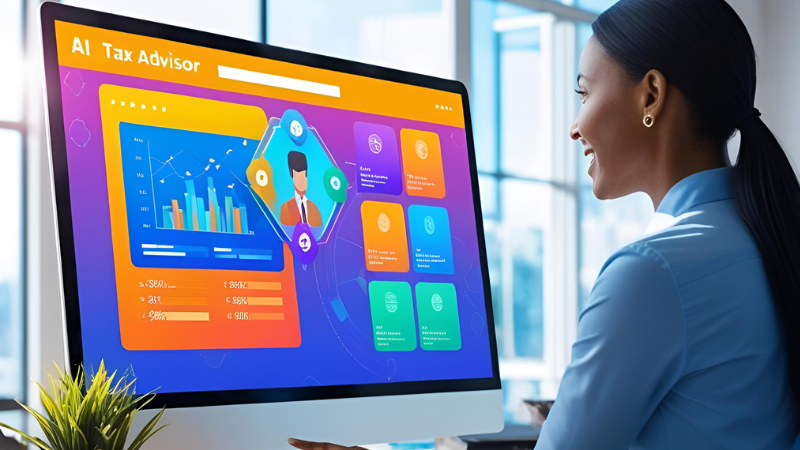AI Is Revolutionizing Global Tax Planning
Artificial Intelligence (AI) and automation are now revolutionizing how tax professionals, accounting firms, and global businesses manage their tax and accounting functions. From identifying compliance risks to enabling tax optimization across jurisdictions, AI-powered tools and intelligent solutions are dramatically reshaping the tax world.
Moreover, if you’re a tax practitioner, financial advisor, or business owner seeking a competitive advantage, this guide will uncover how AI in tax is transforming the industry—unlocking better financial planning, risk management, and strategic outcomes for today’s global enterprises.

The Evolving Role of AI in Modern Tax Functions
Artificial intelligence (AI), machine learning, and generative AI systems now play a central role in the tax and accounting industry. These technologies enable tax teams to analyze vast amounts of financial data, identify potential risks, and create high-impact tax strategies with precision and speed.
In addition, by automating routine tasks such as data entry, tax calculations, and form generation, AI-powered systems allow professionals to focus on delivering valuable insights and strategic guidance.
Key Benefits of AI in Tax Planning

Adopting AI-powered solutions gives companies a competitive edge in today’s fast-paced regulatory environment. Specifically, here’s how AI benefits modern tax operations:
- First, it minimizes human error in complex tax calculations
- Second, it streamlines tax filing and form submission
- Third, it enhances compliance through real-time data analysis
- It enables tax departments to make informed, data-driven decisions
- It helps identify cost savings and clean audit-ready data
- Lastly, it aligns tax decisions with broader financial planning goals
Automated Tax Compliance and Risk Management
Navigating the latest tax laws across multiple countries is increasingly challenging. Fortunately, AI tools assist by automating tax compliance and supporting advanced risk management:
- Regulatory tracking: AI scans and updates systems as tax laws evolve
- Smart compliance monitoring: Flags discrepancies and risky filings automatically
- Audit readiness: Builds a digital paper trail for smoother audit processes
As a result, companies significantly reduce compliance risks, improve accuracy, and streamline tax workflow management.
Global and Cross-Border Tax Automation
Cross-border tax automation helps multinational businesses navigate complex, multi-jurisdictional reporting. With AI, companies can:
- Ensure consistent reporting across jurisdictions
- Stay up-to-date on international tax frameworks
- Leverage scenario modeling to test global tax structures
- Maintain compliance with CRS, FATCA, and other regimes
In particular, this is a game-changer for offshore tax planning, where even small regulatory nuances can create significant complexity.
AI-Driven International Tax Strategies

AI in tax planning allows for a more strategic approach, especially when dealing with:
- Transfer pricing documentation
- Optimal entity structure selection
- Managing tax across currencies and time zones
- Coordinating global financial reporting
Ultimately, these tools help multinational businesses reduce tax burdens while maintaining full compliance.
Introduction to AI in Tax Planning
The tax and accounting industry is undergoing a significant transformation with the integration of Artificial Intelligence. AI tools are now being used to streamline planning processes, improve accuracy, and enhance client services.
Consequently, professionals can shift focus from routine work to high-value tasks like strategic planning and insight delivery. As this trend accelerates, adopting AI solutions is becoming essential to remain competitive.
How AI Empowers Tax and Accounting Professionals

AI isn’t replacing professionals, it’s elevating them. By automating repetitive, time-consuming tasks and enabling real-time analysis of sensitive data, AI frees up professionals to focus on strategy, client service, and impact.
More Time for Strategic Advisory
With automation handling processes like data entry and calculations, professionals can instead focus on tax structuring, wealth planning, and high-level engagement.
Enhanced Accuracy and Insight
AI platforms reduce errors and allow for better forecasting and scenario analysis, leading to more proactive planning.
Ongoing Skill Development
As AI evolves, tax professionals gain new opportunities to expand their capabilities with comprehensive training in AI fluency and data literacy.
Real-Time, Data-Backed Decisions
AI tools provide immediate analytics and personalized reports—allowing professionals to deliver faster and smarter recommendations.
The Critical Role of Training Data
The performance of AI systems hinges on the quality of training data. Therefore, using clean, unbiased datasets ensures that AI models:
- Generate accurate and fair results
- Support informed and compliant decisions
- Avoid systemic bias and legal pitfalls
In other words, ethical data practices and human oversight are key to trustworthy AI.
Tax Technology Solutions for Enterprises and HNWIs
Advanced tax tech offers specialized benefits:
- For businesses: Platforms like ONESOURCE automate compliance and reporting
- For HNWIs: Solutions like BNY Mellon Wealth help manage complex estates and international accounts
Together, these platforms consolidate tasks, protect data, and power smarter decisions.
The Future of AI-Powered Tax Practice

The tax profession is shifting, from reactive to predictive. Thanks to AI, we’re entering a new era where:
- Tax teams provide scalable strategic planning
- Professionals gain deep insights through AI-driven analytics
- Firms become more agile, efficient, and future-ready
Ultimately, firms embracing AI will be better positioned to handle seasonal peaks, regulatory changes, and global expansion.
Conclusion: Embrace AI for a Smarter Tax Strategy
AI-powered tax solutions are changing the game. Now, professionals and firms can:
- Increase accuracy
- Discover hidden opportunities
- Scale without increasing costs
In short, the future of tax planning is smart, strategic, and AI-driven. Don’t get left behind.
Human Expertise in AI-Powered Tax Planning

While AI enhances tax services, human judgment remains critical. Indeed, professionals must still interpret AI output, manage risks, and guide client decisions.
Moreover, their ability to explain complex tax concepts and build trust remains irreplaceable.
Data Security in Tax Planning
Data security is essential, especially when using AI. Tax pros must ensure that:
- Sensitive data is encrypted and access-controlled
- AI systems are compliant with data protection laws
- Cybersecurity risks are continuously monitored
By doing so, firms protect both clients and their own reputations.
Tax Workflow Optimization
AI helps streamline workflows by automating:
- Data entry
- Tax calculations
- Compliance checks
Consequently, professionals reduce error rates, cut costs, and boost productivity.
Regulatory Considerations
AI adoption comes with regulatory challenges. To stay compliant, professionals must ensure that AI tools are:
- Transparent and explainable
- Free from bias
- Used in accordance with tax laws and industry standards
Staying informed and proactive is essential for ethical and effective AI use in tax. If you need help with your tax planning contact us.




